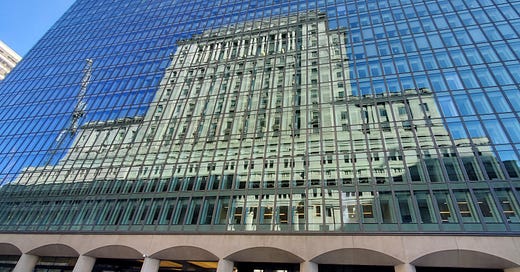The Mystery of the Bloomfield Bridge, Tyler Vigen
This is one of those “I wish I’d written this piece” pieces. (My closest is this one.)
“Why is this bridge here?” it begins, and you can maybe guess some of what follows. It’s a delightful bit of detective work, solving something objectively meaningless. But exactly because the thing itself is meaningless, doing the history is valuable: these are bits of knowledge of our everyday environments that nobody ever records in one place. It gives anybody a chance to do the same basic sort of work as an archaeologist or paleontologist.
I don’t understand why this question is so difficult to answer. There IS a reason that bridge was built, and by golly I am going to find it! Will it be a bribe from a local business? A conspiracy with the construction company? An ordinance that requires a bridge every 5 miles? A makeshift deer crossing built by the DNR? Someone accidentally copy-pasted a bridge when playing Cities: Skylines of Minnesota?
Read the whole thing. If you enjoy my pieces on the histories of random buildings, you’ll love this.
There’s also something kind of spooky about this: it makes you realize just how fragile and contingent a lot of things are, and how easily knowledge can deteriorate.
I know Hannah (from Twitter) and we’ve chatted about this sort of thing: the feeling that everyday life has sort of found an equilibrium at a subtly worse point than pre-pandemic; that things haven’t collapsed or fallen apart as much as deteriorated (there I am again with the doom and gloom).
America was the land of abundance. We had McMansions! Too many McMansions. Too large of McMansions. Too many McDonald’s. Too many fast food jobs, too many fast food workers, making minimum wage. Too many sodas, too many cars, too many gaming PC’s.
And then we didn’t. We didn’t have enough of any of those things, and it was supposed to be a big temporary blip, and here we are 3.5 years later and an apartment in any random town costs $2000 and in New York they can get you for $5000 or maybe even more than that if you have bad credit or they just don’t like you or Mercury is in retrograde.
The car shortage is just a permanent thing. We don’t even make cars anymore, the market isn’t there, the regulations are wrong, everybody wants an SUV, everybody wants them so bad they want to get hit by SUV’s in traffic, and you can’t even haul any of the lumber Home Depot doesn’t have out of the bigass Home Depot parking lot in a Honda Civic. Plus, those little cars are insecure. Roving bands of Tiktok kids can just steal those little cars, because of hackers? Hackers. No hacker shortage. Steal a catalytic converter and sell it on Facebook Marketplace to go buy a self-driving Tesla like a big kid. When the Tesla drives into a construction zone you can blame TikTok videos of other people driving with no hands doing their 3 gig economy jobs. Doordash ice cream so good!
The shelves are full, the shelves are empty, the toothpaste is behind locked glass. You can go out to eat instead, it’s a little bit of a wait, you can only have this table for an hour, is that okay? We do things a little bit different here. It’s small plates. Seven dollar service charge, 50 dollar resort fee for a hotel with no towels.
I don’t know, it’s a pilot shortage. It’s an air traffic controller shortage. School is back, but there’s a teacher shortage.
Every word of this rings true. I’ve said this many times, but what people are identifying in magazine articles or opinion polling as “inflation” is really whatever this is. Read the whole thing.
Texas’s Dying Swimming Holes, The New Yorker, Rachel Monroe, August 30, 2023
When water levels drop, local communities suffer. Concan, a town on the Frio River, is a popular riverfront getaway for Texans. But, for the second August in a row, the Frio was barely ankle-deep in some places, making river trips nearly impossible. When I drove through town, Concan felt empty, many of its ice-cream parlors and tube-rental shops closed. At the real-estate office, nobody wanted to talk about the drought.
There’s a lot in here. This is in one sense a “climate change article,” but it’s also an article about the impacts to real communities with real customs and activities and landscapes being damaged. I’ve made this point before: a lot of conservatives shy away from environmentalism because, in part, it feels like an abstraction. “The planet.” “The environment.” But these problems ultimately hurt very real, very specific people and communities. Something to think about.
Windows 10 and Windows 11 include many features that display internet links you can click on, such as help articles in the Settings screens and Windows programs, search results in the Start Menu, and the Widget articles.
However, when clicking on these built-in links, Windows forces them to open in Microsoft Edge regardless of the default browser you have configured.
This is being changed—in Europe. So:
“How do I make Windows 11 think I’m in the EU?,” someone asked today on the Hacker News social news platform.
More bad consumer stuff from Microsoft. Should’ve gone all the way and broken them up in the ’90s!
Related Reading:
Thank you for reading! Please consider upgrading to a paid subscription to help support this newsletter. You’ll get a weekly subscribers-only post, plus full access to the archive: over 700 posts and growing. And you’ll help ensure more material like this!



